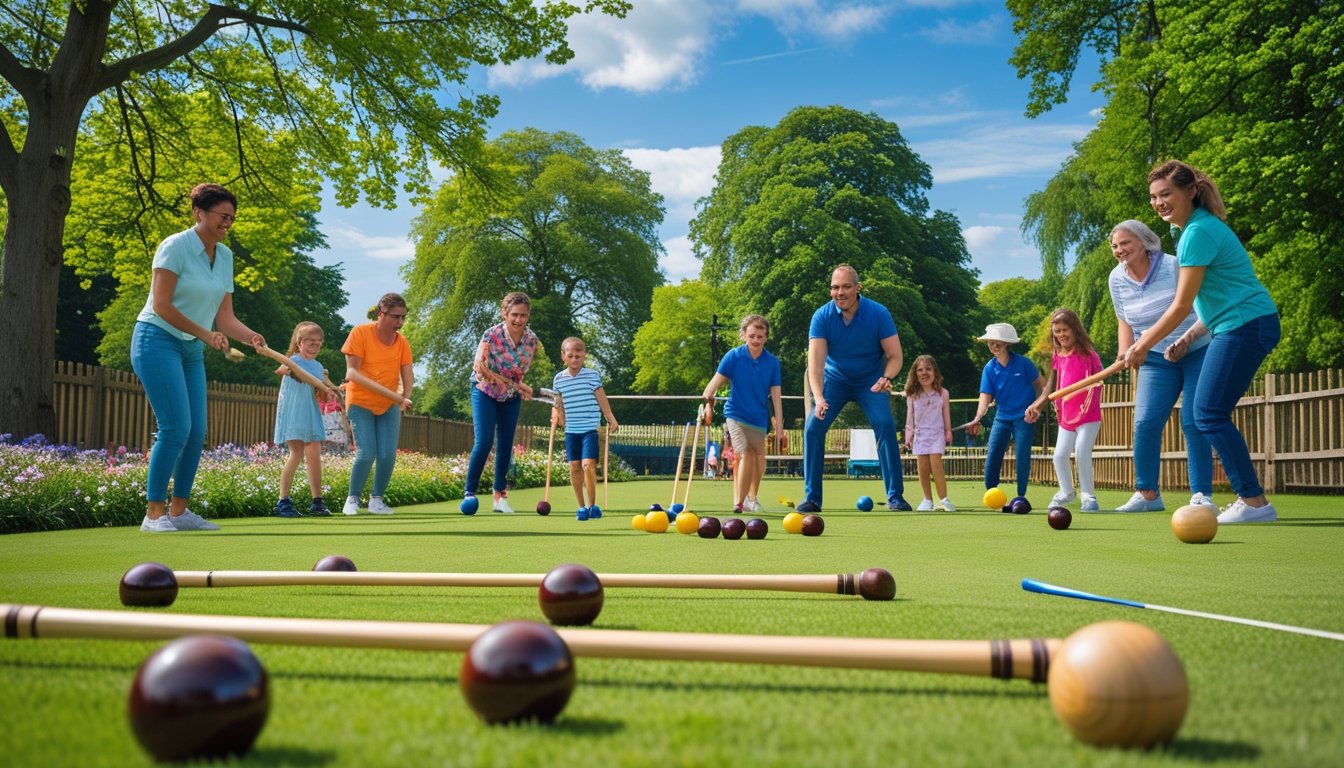Late updated: 31 Jul 2025 12:07
Written by: Emma Saunders
Exploring Traditional British Outdoor Games: A Nostalgic Journey Through Time
Step onto the verdant fields of the British landscape, where a rich array of traditional outdoor games awaits. Exploring these pastimes opens a window into the country's history, culture, and community spirit. From the strategic elegance of croquet to the simple joy of a village fete, these games offer more than just entertainment; they present a fascinating look at British social customs over the centuries.

The charm of these activities is in their timeless appeal, inviting both young and old to partake. Many of us remember playing games like hide and seek or tag during childhood, and these have endured alongside more region-specific favourites such as pétanque or quoits. Whether in a sunlit garden, a bustling village square, or the peaceful countryside, these games have the power to unite people across generations.
Moreover, adaptations have seen classic games like Jenga and Connect 4 transform into large-scale attractions, bringing a whimsical touch to modern gatherings. As we delve into these enduring traditions, it becomes clear that their relevance and appeal are as strong today as ever.
Key Takeaways
- Traditional British games reflect cultural history and social customs.
- Games like croquet and pétanque remain popular.
- Outdoor games continue to unite different generations.
Core Traditional British Outdoor Games

Traditional British outdoor games have been enjoyed across generations, offering a blend of physical activity and strategic thought. From the gentle precision of croquet to the lively chase of British Bulldog, each game provides a unique experience.
Croquet
Croquet, a classic lawn game, merges elements of billiards and golf. Played on well-manicured lawns, the objective is to navigate balls through a series of hoops using a wooden mallet. Traditionally, it involves both strategic planning and tactical shot-making.
Croquet became popular in the Victorian era, symbolising leisure and refinement. Typically played in doubles, teamwork and communication are key. It’s a social game, with tea and conversation often accompanying matches. This makes it a quintessentially British pastime and a charming way to enjoy sunny days outdoors.
Pétanque and Boules
Pétanque, often simply referred to as boules, is a game as much about skill as it is about camaraderie. Originating from France but widely played in Britain, the game involves throwing metal balls as close as possible to a small target ball, known as the "jack."
Played in gardens, fields, and sometimes even on beaches, pétanque requires little equipment and is accessible to all ages. It’s a testament to the community spirit in the British Isles, where it’s common to find locals enjoying this game with a drink in hand on a sunny afternoon.
British Bulldog
British Bulldog is an energetic and lively outdoor game reminiscent of tag. It requires agility and speed, as players attempt to run from one side of a field to the other without being caught by the "bulldog" in the middle.
The game demands stamina and quick reflexes. Safety is essential, so it’s best played on grass to minimise the risk of injury. It’s a brilliant way for children and adults alike to expend energy and savour the exhilaration of pure movement in open spaces.
Blind Man’s Bluff
Blind Man’s Bluff adds an element of the unknown to the traditional game of tag. One player is blindfolded and attempts to catch others guided by hearing and touch.
This game is often played in safe, open areas to prevent accidents. Its historical origins can be traced back to medieval times. It's a game of heightened senses and suspense, encouraging players to rely on instincts. Blind Man’s Bluff emphasises fun and interaction, highlighting the social aspect inherent in British outdoor pastimes.
Classic Garden and Playground Favourites
In our exploration of traditional British outdoor games, we highlight four enduring favourites that have sparked joy across generations. From the strategic yet simple hopscotch to the whimsical poohsticks, these games not only entertain but also promote essential skills such as agility and social interaction.
Hopscotch
Hopscotch remains a beloved classic for its simplicity and fun. Using chalk, we draw a grid of numbered squares on the ground. The objective is to toss a small object, like a stone, onto a square without missing. Players then hop on one foot to retrieve the object, maintaining balance throughout.
This game develops coordination and agility. With variations in rules across regions, hopscotch offers endless possibilities for creativity. Its low equipment requirement makes it accessible to everyone, turning any pavement into a playground. Collectively, children and adults find excitement jumping through the numbered path.
Leapfrog
Leapfrog provides a perfect blend of exercise and teamwork. In this game, players crouch in a line, while the last player leaps over each teammate to take the lead position. It continues in a looping sequence, encouraging both laughter and physical fitness.
Despite its simplicity, leapfrog requires spatial awareness and coordination. It’s exciting for children as they navigate jumping over their friends. Safety is paramount, with an emphasis on ensuring proper technique to avoid falls. A garden or a lawn is an ideal setting for this lively activity.
French Cricket
French Cricket brings a fun twist to the traditional bat-and-ball games. In this pastime, one player, referred to as the “batter”, guards their legs with a bat. The aim is to defend against a thrown ball, hitting it away while keeping the legs protected.
The game demands quick reflexes and strategic thinking. With minimal rules, it engages players of varying ages. Our shared enjoyment of French Cricket lies in its adaptability; it can be played in small or large groups, requiring just a bat and a soft ball. Fields or gardens make excellent venues for these friendly challenges.
Poohsticks
Poohsticks, made famous by A.A. Milne's tales, epitomises simplicity. Players drop sticks from one side of a bridge into flowing water. The objective is for each player’s stick to emerge first on the other side, carried by the stream’s current.
This quiet yet engaging game builds patience and anticipation. Sticks can vary in size and shape, adding an element of unpredictability. It encourages an appreciation for nature and observations about water dynamics. Poohsticks can be enjoyed at wooden footbridges or streams in parks, allowing us to connect with the peacefulness of nature while indulging in friendly competition.
Frequently Asked Questions

In our exploration of traditional British outdoor games, we delve into their origins and discover different ways to engage with these time-honoured activities. From croquet's charm to simple games needing no equipment, there's something for everyone to enjoy. Now, let's examine specific games and how they can be played on various occasions.
What are some classic outdoor games that originated in Britain?
Croquet, with its blend of strategy and skill, is a quintessential British pastime. Pétanque, though French in origin, has found its place in British gardens. Quoits and skittles are also popular traditional games. Each of these games offers a unique flavour of British leisure culture.
How can one play Croquet, and what equipment is needed?
Playing croquet requires a mallet, balls, hoops, and stakes. The goal is to hit the coloured balls through the sequence of hoops using the mallet. A lawn setting, ideally mowed, is perfect. It's a game that combines precision, strategy, and just a bit of competitive spirit.
What games are suitable for playing in the woods with a group of friends?
The woods offer a perfect backdrop for games like Capture the Flag or Sardines. Both games involve teamwork and strategy, blending seamlessly with the natural terrain. Hide and Seek, with its timeless appeal, also suits forested areas, adding an element of excitement and adventure.
Can you suggest some outdoor games that require no equipment for two players?
When equipment isn’t available, games like Tag or Rock, Paper, Scissors are simple choices. They require no setup and are perfect for two players. Another option is a friendly game of Stuck in the Mud, offering plenty of fun and physical activity with minimal preparation.
What types of traditional British games are ideal for playing at night outdoors?
At night, games like Spotlight or Flashlight Tag are thrilling options. The darkness adds an element of challenge and fun, often resulting in laughter and excitement. These games take advantage of dim light conditions, emphasising stealth and surprise for players.
Could you list some simple British outdoor games that children and adults alike can enjoy?
Rounders is a classic that everyone in the family can participate in. It's straightforward and requires minimal equipment—just a bat, ball, and four bases. For even simpler fun, British Bulldog or Simon Says can entertain groups of mixed ages without the need for any setup.
